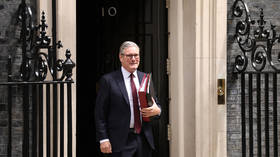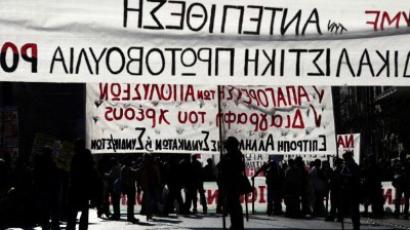‘Credit rating should not shape EU’s policy’
Standard & Poor’s credit rating agency has warned it may cut the European bailout fund's AAA long-term credit rating. With the EU summit looming, the move makes S&P quite a player in the game of European politics, says Belgian ex-MP Lode Vanoost.
“CreditWatch with negative implications" for the European Financial Stability Fund was announced a day after S&P said it was reviewing the credit rating of 15 eurozone countries, including Germany and France. Given that most of the countries put on downgrade review have invested into the bail-out fund, any cut in their rating will drag down the fund as well. Ultimately, the EFSF might be downgraded one or two notches, says S&P in its official release. With the markets going into a frenzy with every new statement from world leaders, there is a risk that S&P’s downgrade of the eurozone and its structures may become a self-fulfilling prophecy, remarks Lode Vanoost, former Belgian MP turned international consultant. “There is something basically wrong when rating agencies become players in the game. You don’t ask a referee before a football match starts,” Vanoost told RT. Still, German Finance Minister Wolfgang Schaeuble has reacted positively to S&P’s warning. The agency’s statement will prompt European leaders “to do what we have promised, namely to take the necessary decisions step-by-step and to win back the confidence of global investors,” he said in Vienna on Tuesday. But Lode Vanoost does not think that Europe needs any “encouragement,” in Schaeuble’s words, from financial structures. “This is a very profound deficiency in European democracy,” says the Belgian consultant. “It is up to governments to decide what kind of financial stability they want, not up to financial markets.”What S&P is after is influencing the results of the upcoming European Union summit in Brussels, says Vanoost. Otherwise, the agency would not make it public, but rather approach central banks and governments.“Putting it before the media is putting pressure to decide on policies they think are suitable,” concludes Lode Vanoost.
But Lord Dartmouth, a MEP from the UK Independence Party, says that complaining about credit rating agencies is nothing but “shooting the messenger.”“This is a fact that S&P and other credit rating agencies report: there are fiscal problems within the EU countries,” Lord Dartmouth told RT. “Politics is not within the credit rating agencies. It is with the leaders of the Eurozone countries.” If S&P is right with their estimate that the “contagion” starting in Greece could spread over the whole Eurozone, it means that even Germany may find itself under the hammer of the crisis, remarks the MEP. "The summit on Thursday and Friday will be the ninth EU summit this year. Each one of these summits came out with some proposals – each one of these proposals tends to be greeted by the market. But when it had sunk in, these proposals did little if anything substantial to solve the crisis. The markets then plunged straight back – and I suspect this is what will happen this time," concludes Lord Dartmouth.
















